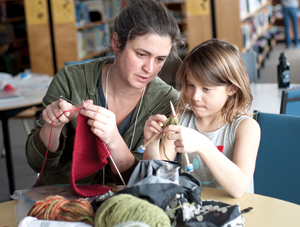Ottawa alternative elementary schools deliver provincial curriculum differently, with primary focus on cooperation and teamwork, not competition
 Joey Gunn likes to remind parents — especially new ones — that choosing the right school for your child is not unlike shopping for a new car.
Joey Gunn likes to remind parents — especially new ones — that choosing the right school for your child is not unlike shopping for a new car.
“I say to parents, ‘The next car you’re going to buy is going to be an Oldsmobile, only because there’s an Oldsmobile dealership on the corner of your block,’” says Gunn. “Now if I told you that, you’d think I’m crazy — you’d want to do your research before making that investment; it’s just the same with schools.”
The analogy goes a long way in explaining why Gunn chose to have his three children attend Lady Evelyn Alternative School in Ottawa.
Years ago, his eldest child started out attending a traditional elementary school, but Gunn says she was bullied in the schoolyard and the altercation was not properly resolved by the school staff. He felt there were shortfallings in the school’s traditional approach to education.
“Like so many parents, we found that the teachable moments were constantly being lost in the public system,” recalls Gunn. “So we decided to look around and went on visits to other schools.”
Their search uncovered a very involved community at Lady Evelyn Alternative School, says Gunn.
“The environment was really welcoming — that was one of the differences we noticed right away,” he recalls. “It felt very open.”
Gunn now serves as parent-council co-chair at Lady Evelyn, as well as co-chair of the Alternative Schools Advisory Committee, which oversees all five alternative elementary schools in Ottawa (see sidebar) and Summit Alternative Middle School.
While under the umbrella of the Ottawa-Carleton District School Board, there are some key differences in how the alternative elementary program delivers the Ontario curriculum, explains Pam Dilworth, who works with Gunn as
the other co-chair of ASAC.
An emphasis on cooperation and teamwork — instead of competition — is a major component of the alternative philosophy. “It’s an inclusive environment and everyone is welcome to join anything,” explains Dilworth, who has two children attending schools in the alternative program.
“We don’t have any sort of competitive situation for children; everybody can play volleyball, we don’t have ‘student of the week.’”
The goal of this approach, Dilworth explains, is to enhance the joy of learning. “It’s about learning not to compare yourself to others; what’s more important is comparing yourself to yourself and setting your own goals.”
As someone who grew up in a very academically-oriented family, it took a lot to release her mindset from the traditional approach to education. But through raising her own two daughters, Dilworth now strongly believes it’s beneficial to eliminate a grading system for younger students.
“I really do think that marks get in the way of a child’s learning; if it’s all about getting an ‘A,’ it’s not all about learning world history, “ she says.
“Our teachers are always evaluating students, but the difference is in how they’re evaluating —instead of marks, their progress reports are anecdotal.”
Dilworth’s eldest child, Emma, began school in the traditional public system. She became concerned when she noticed Emma was very fixated on achieving perfect grades.
“I have two very different learners,” says Dilworth. “When Emma saw she had a B-, she was really upset; she really compared herself to her little sister, who had an A.
“That just doesn’t help her to be a better learner. In my estimation, there’s a place for marks later on in a child’s education.”
She adds that Emma, now 14, has moved from Churchill Alternative School to Summit Alternative Middle School and is now being introduced to marks, in preparation for high school.
And Sara Purdon, a mother of two boys and a parent-council co-chair at Churchill, loves the high level of parental involvement within the alternative program.
“As a parent, you really feel like you’re adding to what’s happening in the classroom,” she says, recounting multiple projects she and her husband have gone into the school to help with.
She adds that every few months, the school offers electives in art, science or math that students can choose from. These are special activities that breathe new life into the curriculum, while finding new ways to illustrate classroom concepts.
Recently, for example, Purdon had the chance to help her eight-year-old son Oliver make cinnamon buns at Churchill.
“By baking, we were reinforcing the fractions that the kids were learning in math,” says Purdon. “There was also some sort of spiralling equation that tied in nicely with the swirl of the cinnamon buns.”
With mixed-age groups, there was a lot of helping in the kitchen, she recalls.
“Some kids were in Grade 6 and some were in Grade 1; the older ones were helping the little ones measure their ingredients,” says Purdon. “These kinds of experiences are what is really memorable — it sticks with them.”
Photo: Kate Settle, www.katesettlephotography.com


